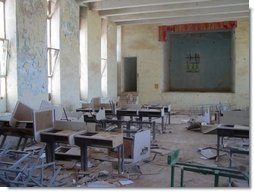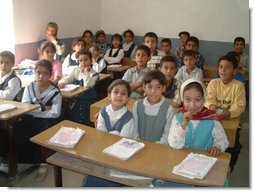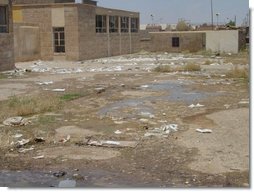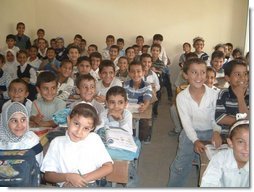November 14, 2003
Leslye Arsht
Good afternoon, it is nice to be with from Baghdad where it is 10:00pm.
It might surprise you that it is suddenly Fall here. After a summer of daily 130 degree plus days, it is now a cool 61 degrees here. I am pleased to join you, and I look forward to taking your questions on Iraq's education system.
Michael, from Powell, TN
writes:
Would the educational system we will help establish in Iraq by like
America's public education in any way?
Leslye Arsht
Initially, the Coalition, working with a team of Iraqi teachers, removed all political references to Saddam and his Ba’ath party from the text books. A national dialogue will soon begin across Iraq to define what Iraqis want their education system to be. To help them – we are collecting the experiences of other countries that have emerged from authoritarian rule such as Bosnia, Latvia, and the Czech Republic.
Michael, from San Fransisco, California
writes:
Hello Leslie,
The subject line (Education in Iraq)caught my eye as it seems it may be some
time before there is any possibility of a safe, structured and legitimate
environment for anything in Iraq, let alone the kind of peaceful
environment required for academics. It is a noble idea.
I currently attend classes full time online in the US (AIU Atlanta,
Georgia)and I couldn't feel more fortunate to have this kind of learning
environment, technology and infrastructure available to me.
My question is, where and when does one begin such an undertaking? And what
are the administrations goals for education in Iraq in light of the present
situation?
Regards,
Michael
Leslye Arsht
We began by removing the Saddam related material from the textbooks, but that was just the beginning. We have prepared master teacher training for a selection of teachers, principals and supervisors from across Iraq. These will train their colleagues in proven instructional delivery and classroom practices that engage children in their learning. Under Saddam, teachers were overly dependent upon whole class lecture and memorization without student understanding.
Kim, from Kentucky writes:
Hi Leslye, I care and am concerned about the education field in America, but
I feel pretty foolish that I didn't know much about the education system in
Iraq. What is the current status of the education system there? Good
luck--I wish you continued success and all the best in your future
endeavors
 Leslye Arsht
Leslye Arsht
Education in Iraq in the 1980s was among the
highest performing systems in the region. But Saddam Hussein used
teachers as an extension of his political party to spread propaganda. In addition, he stopped professional development. Teachers, like the rest of the nation, were cut off from the progress that was occurring in the rest of the world. The most obvious effect – though not by any means the only one – is that thousands of school buildings have not been maintained.
Instead of spending money on upkeep of vital infrastructure needs, he
spent money on his own lavish palaces and a large war machine.
School windows
and doors were broken and toilets didn’t work. Part of the Coalition effort has been to begin rehabilitating school buildings, provide new desks, new blackboards and school supplies for students and teachers.
 We have rehabilitated over 1700 schools and over 10,000 more need repair.
Clearly we are making progress, but much more work is still ahead.
We have rehabilitated over 1700 schools and over 10,000 more need repair.
Clearly we are making progress, but much more work is still ahead.
Lindsey, from Texas writes:
Hello, I am 15 years old and wanted to know what girls in Iraq would be
learning at my age. Thanks.
Leslye Arsht
Hello Texas! That’s where I’m from. I grew up in Houston, and my mother still lives there. Students here between the ages of 12 and 17 take many classes per day. Those classes include math, English, geography, Arabic, religion, history, science, chemistry and physics. They take tests at 6th, 9th, and 12th grades and must pass each one in order to move on to the next level of schooling.
Caleb, from Vancouver, WA
writes:
How is teaching in Iraqs schools different than when they were under
Saadam's rule?
Leslye Arsht
The teaching hasn’t changed so much yet – except that children are not longer required to stand up every day and sing a song to Saddam Hussein before school starts.
Over time, teachers will begin to use proven classroom learning rather than relying only on memorization without understanding. Just this week, another 200 Baghdad-based teachers, principals and superintendents are completing training.
These will join 100 others from around Iraq with the Master Teacher classification and will train additional teachers in their home governorate (district). At the end of this month, teams of trainers will conduct training across Iraq and will reach nearly 800 by the end of 2003.
Bob, from Saratoga Springs, NY
writes:
What can an interested and supportive citizen of the U.S. do to assist those
responsible for the education of Iraqi children?
Leslye Arsht
Iraqi schools lack many things that the Coalition and other countries are attempting to provide. Most schools don’t have libraries or science labs or sports fields or equipment. In addition to what we are providing, we are looking to organize some substantive projects that American children can help support. Stay tuned!!
Lara, from Manchester writes:
What kind of education system will be set up in Iraq? Will be like our's with
elected officals running each district or will there be a completly new
system set up?
Leslye Arsht
The Iraqi Minister of Education, Dr. Ala ‘din Alwan, will begin a process across Iraq in which all sectors of the country will be engaged in talking and thinking about what the education system should look like and deliver here.
This follows the model of other countries around the world that have been allowed to democratize their education system. The important thing is, Iraqis will decide what is best for their children.
Barbara, from Indiana writes:
How many students in Iraq are enrolled in higher education? How many public
colleges and how many private colleges exist there?
thank you
Leslye Arsht
In the Iraqi system, the Ministry of Education covers K-12 and is separate from the Ministry of Higher Education that oversees the colleges and universities. Maybe someone from Higher Education will be on some time to answer questions.
N, from D writes:
I have not read anything thus far on the planned educational curicullum of
Iraq,and if you will be in charge of that aspect or not. However my question
is whether the children of Iraq will be receiving a western style education
or their normal curicullum, but an excess of more information, in part of
introducing them to other country's cultures and information in general?
Leslye Arsht
The Iraqi system of education is different from western offerings, but some of the most effective practices in the classroom are successful across cultures and systems.
The Coalition is providing Iraqi teachers access to those proven practices so they can start implementing them in the classroom immediately. Changing the curriculum – that is what is taught – will take 2 years or more for Iraqis to decide. Iraqis are already considering including subjects such as democratic principles and human rights.
Judy, from Toledo, Ohio
writes:
Dear Leslye, Is there a shortage of teachers in Iraq? Have women been
attending universities and obtaining education degrees? If so, how are
those degree programs organized - by subject matter or general education?
Thank you,
Judy
Leslye Arsht
There are many teachers in Iraq, but like in the United States and other countries, it is often difficult to staff rural schools. Teachers here are specialists in their subjects, even in elementary schools.
In the current Iraqi system, some primary school teachers are also trained starting in the 9th grade for 5 years, or after 12th grade for 2 years. Secondary school teachers are trained in special teacher training colleges or universities.
Under Saddam’s regime, teachers were paid only $5.33-$13.33 per month. The Coalition has increased that salary to $66.66-$333.33 per month.
Keith, from Seattle, WA
writes:
Thanks for taking our questions, and for your service to our country
Can you tell us specifics of Saddam's propaganda in the educational
curiculum? Was that a key to how he stayed in power?
Leslye Arsht
From the youngest primary texts all the way through the 12th grade texts, Saddam's picture, quotations from him , celebrations of his birthday and other events are embedded in the texts.
Really, fear kept Saddam in power. And his presence was everywhere, especially in schools.
For example, this quote below is an example of the pervasive propaganda
contained in textbooks.
Quotation from an Iraqi History Textbook for 12th Grade
“The Role of the Leader Saddam Hussein (God Bless Him) in the Second Qadisiyya and Mother of All Battles:
The Leader played the main role in the Second Qadisiyya. His method in leading military maneuvers, and his great ability in national mobilization, played a great role in achieving victory and obliterating the evil Iranian attack.
He led from the very beginning the pace of the war in all its activities and major arenas, and he was there with the soldiers in most of the important battles…In the mother of all battles, and under its great banners full of pure martyrs blood, the leadership of the fighting leader Saddam Hussein (God Bless Him) is not just as a beloved national leader, but he is also a symbol of the great national condition and true patriotism.
Everyone agreed on his leadership as a clear sign of national unity due to his confrontational spirit, which he presented before and during the fight, in front of the evil forces…Saddam River is an Iraqi miracle and one of the great achievements to oppose the oppressive sanctions and a sign of Iraqi defiance.
In this way, due to its smart leader, Iraq was able to destroy all the imperialist and Zionist plans.”
Joshua, from Birmingham writes:
Isn't is very hard for students to learn with U.S soldiers riding around
constantly and suicide bombers attacking? Do you think that students are
concentrating on their school work or being killed or hurt in an attack
on U.S troops?
Leslye Arsht
I'm sure some students do worry about their
safety. Especially in some of the more unsettled neighborhoods. But
other parts of the country are returning to a more normal tempo. You can
see young girls walking to and from school together and kids shopping in
open air street fares. Schoolwork is highly valued here. Also, teachers and other members of the coalition in Iraq are helping with the security of schools.
 Millie, from Ohio writes:
Millie, from Ohio writes:
Dear Leslye What were the conditions of the schools during the war?
Were the Iraqi children excited about going back to school? Thank you
for taking our questions. My family has alot of teachers so we know the
importance of schooling in all schools and univerisites. Are the
colleges and university also open for classes? Thanks Millie
Leslye Arsht
Schools have been deteriorating and without basic maintenance for over 20 years. I wish I could show you some pictures. As a matter of fact, I will email some. Iraqi children went right back to school after the war and even took their end-of-year exams. This fall they certainly were excited to go to newly refurbished schools and getting new book bags with school supplies.
 Colleges and universities are all open.
Colleges and universities are all open.
Elizabeth, from Kansas writes:
I would be interested
in an opportunity to help coaltion forces in Iraq.
how did you make the decision to go to Baghdad? Are there any
backgrounds or skill sets that are needed over there?
Leslye Arsht
I received a call from the Department of
Defense, Office of White House liaison out of the clear blue. However, I had started and been running a non-profit education reform organization called StandardsWork that help schools and state districts and schools improve their performance. And I had been suggested for the post by a colleague, Dr. Bill Evers at Stanford who is also here in Baghdad now as a senior advisor.
He and I work together when California was setting their academic standards. And both of us thought this was an opportunity of a lifetime to help another country reestablish its education system.
There are all sorts of people who are here -- government and others. We would welcome an Arabic speaking web site manager for the Ministry of Education.
Jeanne, from Andover, MA
writes:
What can be done to close down the schools in the mid east that teach
hatred, Islamic Fundamentalism and fuel terrorism? How can we encourage
the creation of schools in that Region that teach children skills that
will make their countries successful? I wish you success in your
mission to help Iraq build an education system that helps the children
of Iraq reach their full potential. I have heard that our soldieres are
doing great work to help the school children in Iraq. I hope that other
Arab countries (Saudi Arabia, Iran...) stop teaching hatred and
intolerance in their schools.
Leslye Arsht
The coalition forces have in fact been working very hard to improve schools in Iraq. But the central question here really can be best expressed by the experienced of Iraqis in the northern portion of the country where the U.S. and U.N. provided protection against Saddam for the last 12 years -- there the schools now offer children who speak languages other than Arabic. They are taught their classes in their language -- including kurdish, and they are taught their own religions in schools, The reason I mention this is that Iraq has a rich and varied ethnic mix of religions and cultures which are given great respect in that part of the country that was allowed to honor differences.
the new minister of education in Iraq, Dr. Ala'din Alwan , speaks eloquently about his hopes that Iraq will soon have a system of education that values and protects all the different peoples here. It is important to say that people of the middle east are generally peaceful people. A few terrorists have hijacked the Muslim religion to promote their own extremist agenda.
Franklin, from Lexington, KY
writes:
What progress has been made on education in Iraq, and what else still
needs to be done?
Leslye Arsht
We've exceeded our goal in rehabaliting 1,000 schools by fixing 1,748 schools in Iraq. Over $63 million was spent in those school rehabilitations. The coalition also provided 7,000 schools in a box which contained school supplies for teachers and students. They provided 1 .5 million school bags including calculators for high school students.
And they distributed blackboards and teacher desks for all secondary schools. Over 300 teachers, principals and supervisors have already been through a master teacher training course and another 500 will complete it before the end of the year.
The major undertaking for us is to repair or rebuild over 10,000 school buildings and to construct at least 4,500 new ones to relieve the pressure that schools face now with double and triple shift in a single building.
In addition, most of the schools in Iraq have neither libraries or science labs. and these are two key areas that we will be active to support with the help of other donor countries.
Doug, from New Hampshire
writes:
How many people work on your staff? how many people are
working to renew
the educational system in iraq?
Leslye Arsht
Hello to New Hampshire -- I'm a trustee at Franklin Pierce College in Ringe, New Hampshire. We have a staff of a dozen in the CPA senior advisory group, but in the Education Ministry there are an estimated 1,200 in Baghdad including the training institute for in-service teachers and a total of 292,000 teachers are employed across the country. They serve nearly 6 million children and young adults from kindergarten through teacher training courses.
Leslye Arsht
This has been a great reconnecting to America and to its interests in the challenges of Iraq. Many people working here worry about the tenor of the news coverage that focuses on daily, trying events. But those reports do not capture the depth and breadth of the progress we make or the hard work of Iraqis working with us to rebuild their country. I'd like to thank everyone who sent in questions and I look forward to joining you again in the future.









